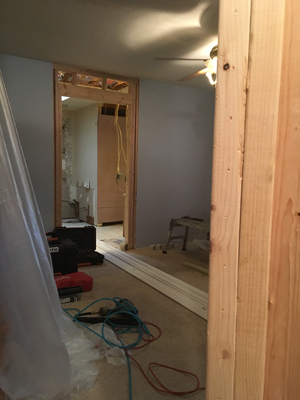 As a polio survivor since I was an infant, living with a disability has been my “normal.” But, like most polio survivors, I just gritted through the limitations and inconveniences, trying to keep up with everyone else.
As a polio survivor since I was an infant, living with a disability has been my “normal.” But, like most polio survivors, I just gritted through the limitations and inconveniences, trying to keep up with everyone else.
I’ve been thankful for the opportunities to speak to children about what it’s like to live with first a limp, and now the need for a scooter to get around, as several months ago I stopped being able to walk. My favorite thing to tell them is, “I am not my polio leg. I am me. You connect with me by looking in my eyes. When you see someone in a wheelchair, please look in their eyes, because that’s where the person is.”
In a world of increasing bullying and growing coldness toward other people, and in the hope of allowing compassion to grow, I’m hoping that you might find it helpful to know what it’s like to live with a disability. My disability is physical; I don’t really know what it’s like to live with an emotional disability, or an intellectual disability, or even a physical disability that is invisible but all-too-painfully real, such as deafness, cystic fibrosis, or debilitating pain. But some things are still true across the board.
In no particular order, here are some things I hope you find helpful in order to show more grace to folks like me.
Everything takes longer. The smallest personal care chores, like showering and getting dressed, or even fixing a cup of coffee, are harder and they consume time. (I’m still learning this, and apparently I’m a slow learner because I’m so optimistic by nature that I keep forgetting how long things really take.)
Life is permeated with frustration. On my first flight after losing the ability to walk, the American Airlines software wouldn’t let the gate agent change my seat from the back of the plane. Strapped into an aisle seat that barely clears the arm rests of row after row of fellow passengers, being taken to my seat was hard. And embarrassing.
Obstacles abound. In a wheelchair or scooter, barriers like stairs and sand proclaim, “You can’t go here.”
Social activities are restricted. If a building isn’t handicap-friendly (and having just two steps is enough to do that), there’s no point even to trying to attend. Things are much better in the U.S with the Americans With Disabilities Act, but I won’t ever be able to travel to Belarus again; the former Soviet states are so handicap-hostile that you almost never see a soul in a wheelchair. Many just don’t leave their home.
People stare. Children are (quite understandably) curious about anything and anyone different, but still, the stares from both kids and adults silently shout, “You don’t fit in. What’s wrong with you? You’re a freak.”
Am I invisible? On the other end of the spectrum, it’s amazing how few people will make eye contact with someone in a wheelchair or scooter. Hey! I’m still here! Ready to interact with you! Sometimes, waiters ignore patrons with a disability, not even asking for their order.
Extreme weather is a nightmare. Rain and snow are enemies of mobility equipment, especially anything with electronics. I lost my first scooter to rain in Cozumel. That was hard, losing my only means of mobility in a foreign country.
Bathrooms. Many bathrooms don’t have stalls big enough for a wheelchair or scooter. In private homes, bathroom doorways aren’t wide enough to get through. I’m sure you can imagine what a challenge that presents!
It’s expensive. The tools and assistance we need are not cheap: walkers, canes, grab bars, widened doorways, raised toilets, and ramps—not to mention wheelchairs and scooters—are costly. You probably can’t guess the price tag on an adapted car or van that allows a disabled person to drive.
Losses. We are continually facing the next “one more thing” we used to be able to do. And it hurts.
Other people’s self-centeredness. I love to cruise; it’s a perfect vacation for mobility-challenged people. But it is just staggering how many people will wait with me for an elevator and then rush inside to claim their place. It literally only takes a few seconds for an elevator to fill with too many people for there to be room for my scooter. Naturally, no one will look at me until the doors close.
May I make some suggestions for responding to those of us with disabilities?
Please don’t . . .
Please don’t try to fix us or shame us for being where we are. Some people have been asked, “What’s the prognosis for _______?” When told it’s progressive, some people have heard, “Well, it will be as long as that’s your attitude!”
Please don’t “help” us without asking. Some people have been grabbed by the arm to steer them or attempt to give support. I’ve had taxi drivers suggest that I shift my weight to my barely-functioning polio leg because it made sense to them. Please, just let me figure out what I need to do to make things work.
Please don’t assume it’s God’s will to heal everyone this side of heaven. If that were so, Paul would not have been given his thorn in the flesh and told God’s grace was enough, and His power is perfected in weakness. (2 Corinthians 12)
Please don’t assume our disability is because of unconfessed sin. Plenty of us have asked, “What did I do wrong?” and God, one way or another, has given us John 9 grace. “Neither this man nor his parents sinned,” said Jesus, “but this happened so that the works of God might be displayed in him.” (John 9:3)
Please don’t try to explain what God is up to. Nobody knows the specifics of God’s plan to bring good to us (and our families, and our friends) and glory to Himself. Let’s just trust His goodness and give up on offering explanations.
Please don’t try to make us feel better about our disability. Don’t start any sentence with the words, “At least . . .” It’s not comforting. It’s minimizing.
But please do stay sensitive to God’s leading on how to encourage us. One of my pastors asked me if I’d like to run a marathon with him in heaven, when we’ll both have healthy, strong resurrection bodies. Now that was encouraging! Several friends have asked, “Would you allow me to bless you by bringing your family a meal?” (Then they affirmed me for not giving into my old pattern of “Oh, I’ve got this, thanks” independence.)
Please do let us know if you see Jesus shining through us. Many of us deeply, desperately want the difficulties and suffering of living with a disability to be sculpting in us “an eternal weight of glory, far beyond all comparison” (2 Corinthians 4:17).
And please do smile when you make eye contact with us.
Because we’re not invisible.
This blog post originally appeared at blogs.bible.org/engage/sue_bohlin/what_its_like_to_live_with_a_disability on March 6, 2018.
 We are in the midst of a major remodeling project in our home as it is made wheelchair-friendly. Doors are being widened, our closet is being reconfigured so I can reach my hanging clothes, and our bathroom’s tub and step-in shower are being replaced by a roll-in shower.
We are in the midst of a major remodeling project in our home as it is made wheelchair-friendly. Doors are being widened, our closet is being reconfigured so I can reach my hanging clothes, and our bathroom’s tub and step-in shower are being replaced by a roll-in shower.